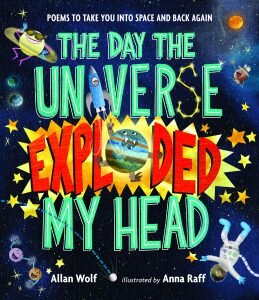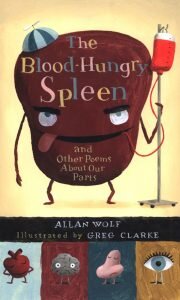We are so excited to have Allan Wolf join us today to share information about his poetry collections!
Allan Wolf is the author of picture books, poetry, and young adult novels. A skilled and seasoned performer for the past 30 years, Allan Wolf’s dynamic author talks and poetry presentations for all ages are meaningful, educational, and unforgettable. Florida Reading Quarterly calls Wolf “the gold standard of performing poetry.” Wolf believes in the healing powers of poetry recitation and has committed to memory nearly a thousand poems. Wolf has an MA in English from Virginia Tech, where he also taught. He moved to North Carolina to become the artistic and educational director of the touring group Poetry Alive!. Wolf is considered the Godfather of the Poetry Slam in the Southeast, hosting the National Poetry Slam in 1994, forming the National Championship Team in 1995, and founding the Southern Fried Poetry Slam (now in it’s 27th year). He has won many awards, including Bankstreet College’s prestigious Claudia Lewis Award for Poetry. His latest book of poems for kids, The Day the Universe Exploded My Head: Poems To Take You Into Space and Back Again, is now in bookstores!
Welcome, Allan!
So You Wanna Write a Poetry Collection? by Allan Wolf
Okay, let’s cut to the chase. Poetry is a “hard sell” in ANY economy, so keep that in mind. Even if you are the best of the best, your best may not make you a household name in the world of children’s book publishing. That, of course, never stopped me. Nor does it stop the very dedicated, talented, and prolific group of poets writing for kids today. Just check out any of the titles from WordSong Press (a press devoted solely to children’s poetry). The first thing you’ll notice is that 99.9% of the poetry collections published today are “thematic.” Poems about the seasons, poems about the weather, poems about bugs, poems about sports, etc, etc. That’s because it is the theme, and not your unknown name, that will be THE main marketing hook to sell your book. Sorry folks, unless you are Shel Silverstein or Jack Prelutsky, you’ll need to get thematic.
At first this may seem limiting—(Q: How many poems about penguins can a poet write? A: Check out Antarctic Antics by Judy Sierra!)—but in the end, you will find that it will make each individual poem more focused, and it will give the overall collection cohesiveness and continuity. I have written poetry collections about anatomy (The Blood-Hungry Spleen), about the solar system (The Day the Universe Exploded My Head: Poems to Take You Into Space and Back Again), and about a school garden (Welcome to Our Magic Garden—due out in 2023). See what I mean? So, find a topic that has some potential, see what other books are already out there, and then go to it.
The Day the Universe Exploded My Head almost wrote itself. Automatically I knew I had to write a poem for each planet, and so I had to figure out what made each one special. You can see, already, how the ideas might begin to just spring from the research. Did I say research? Yep. Research is your bestest friend. All fancy springs from facts. Consult other nonfiction books on the topic and you’ll see how other authors have divided up the content. You can write all your poems in the same format or vary the format to fit each poem’s subject. I usually do the latter. Longer poems are better suited for older elementary. Shorter for younger elementary and pre-K. I LOVE to rhyme cause that’s how I’m wired, but rhyme is dangerous if you have to force it. Rhyme without rhythm is a clunky train wreck. When in doubt, try free verse. Free verse can be beautiful, lyrical, and even contain musical internal rhymes that turn your poetry into flow-etry. Finally, remember that kids are not stupid, so don’t write stupid poems.
Good luck with this month’s PB writing challenge. Keep it simple. Have fun. And metaphors be with you!
You can find Allan on his website, on twitter @AllanWolf100, or instagram @allanwolf100.
Thank you for joining us, Allan!



